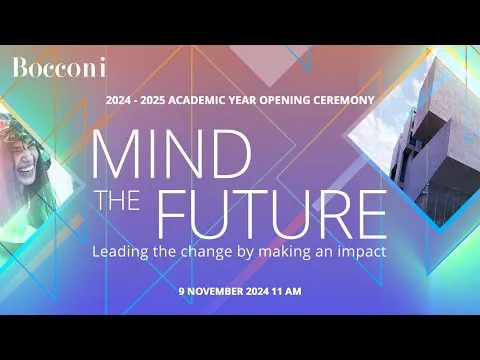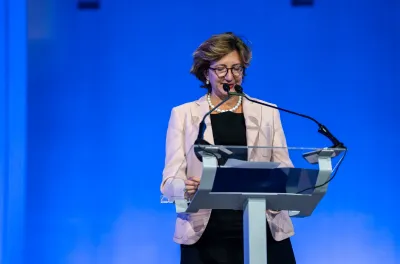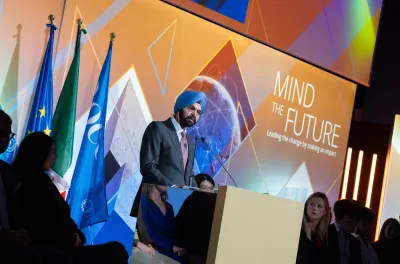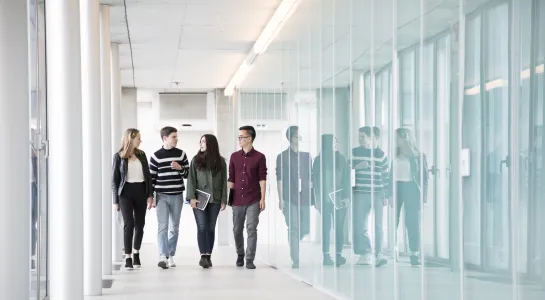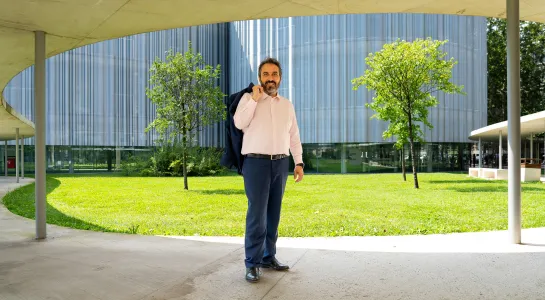
Bocconi as Leading Player in the University Century
At the end of the 21st century, it is estimated that more than half of the world’s young people will have a post-secondary level of education. This is, therefore, the university century – in which universities will be at the center of the future of businesses, institutions and all of humanity. With this in mind, Bocconi University inaugurated the 2024-2025 academic year today – the 123rd year since its founding – demonstrating the development strategies and outcomes it has set in place to become a leading player of this future. Starting from its three missions of being a global educator ahead of its time, a research university capable of having a concrete impact on society, and an institution that constantly and actively engages with its community along with all of society and institutions – from Milan to the rest of Italy, from Europe to the world.
The opening ceremony featured speeches by Bocconi President, Andrea Sironi, as well as President of the Bocconi Alumni Community, Silvia Candiani, and Rector Francesco Billari. Ajay Banga, President of the World Bank Group, delivered the keynote address.
“Thanks to a significant economic effort supported by the University, we have further increased financial aid to capable and deserving students. On our part, we will not diminish efforts to enable the social elevator, foster intergenerational mobility and promote more equitable access to quality education,” highlights President Andrea Sironi. “This is a global challenge, as also documented by the OECD in its “Education at a Glance 2024” report. It states that less than 20% of adults manage to graduate from university if their parents do not have a high school diploma. On the other hand, 72% of adults who have parents with a university degree complete their own degree.”
“The growth of young populations in many parts of the world represents an extraordinary opportunity for countries that will be able to integrate these talented students into their education and business systems,” adds Rector Francesco Billari. “European universities must have the courage to be increasingly more open to students from all over the world, for a true global impact. With this appeal, the finest universities will have additional responsibilities: to continue serving not only their own communities and countries, but also those of new students.”
Ajay Banga addressed students directly in his speech devoted to the essential traits of effective and successful leadership in an era of global challenges: “The challenges we face – climate change, inequality, fragile economies – belong to all of us, and none of us can solve them alone. When you leave Bocconi and begin your careers, I hope you’ll hold on to that sense of shared responsibility and remember that leadership isn’t just about what you achieve, but how you achieve it.”
A shared sense of responsibility that is also underscored in the words of Silvia Candiani, President of Bocconi Alumni Community: “The more than 144,000 Bocconi alumni are an active and vital part of the community, they promote every day the University's values around the world. Alumni become reference points for new generations of students – offering support, inspiration and international connections. The connections between generations of alumni create a continuous flow of interactions and collaborations that fuel the community’s growth and strength, with a strong impact on society.”
Bocconi Higher Education: Global and Future-Oriented
In a century when universities will be the leading players of progress, responding to the call of the future requires an education that is distinguished by quality, rigor and innovation – increasingly international, interdisciplinary and research-based.
According to the QS World University Rankings by Subject, Bocconi ranks first in the European Union in Accounting, Economics & Econometrics and Marketing, and second in Business & Management Studies. If we look at post-experience education, the MBA program – which celebrated its 50th anniversary this year – reached third place in the Financial Times’ world ranking. SDA Bocconi School of Management also achieved EQUIS accreditation confirmation during 2024, affirming it as one of 122 business schools in the world with “triple crown accreditation”.
For the 2024-2025 academic year, 40% of first-year students in both the Undergraduate School and School of Law are international students, while 70% of Bachelor and Master of Science programs at Bocconi are currently taught in English. Additionally, starting from the 2025-2026 academic year, Bocconi’s entire Master of Science offer will be in English.
On the subject of Master of Science programs, in 2025-2026 the new Master of Science in Data Analytics and Artificial Intelligence in Health Sciences will be launched, established in collaboration with Humanitas University. This program, also entirely in English, will train participants to develop and apply the most advanced artificial intelligence and data science techniques for health.
Bocconi’s global approach is also manifested through its wide network of collaborations, which extend to six continents. The University boasts 288 partner universities in 55 countries and offers 37 double degrees with other prestigious institutions. In the last academic year, we offered more than 2,500 study abroad opportunities, allowing our students to enrich their academic careers through experiences at universities around the world. In parallel, more than 2,100 students from partner universities chose to attend a semester at Bocconi, confirming the University’s global appeal as an educational destination of excellence.
Innovative teaching methods and experiential learning help train future-proof students, as evidenced by the 95.7% employment rate one year after graduation, with 36.4% of students working abroad.
Education is also lifelong learning. Over the past year, more than 16,000 participants from more than 70 countries – representing 250 companies and institutions – have taken part in the various programs offered by the SDA Bocconi School of Management, confirming the School’s role as a leader in post-experience managerial training.
Impactful Research for a Better Future
The quality of Bocconi’s research is reflected in the QS World University Rankings for Social Sciences and Management, where Bocconi ranks first in the European Union and 16th worldwide. Furthermore, specific indicators related to the quality of research demonstrate that Bocconi is first in Europe for citations – a tangible sign of the impact of its scientific production – and fourth for academic reputation, a testament to how highly regarded the University’s research is by the international academic community.
One of the most concrete indicators of the quality and relevance of the research is the ability of our researchers to be selected for projects by the European Research Council (ERC). These are the most prestigious European research grants, and, as we have seen, have also been defined as the gold standard in the Draghi Report. Since the ERC’s inception in 2007, Bocconi has obtained 64 funded projects – establishing itself as the top institution in Europe in the "Individuals, Markets and Organizations" subject area with 34 projects.
A particularly significant finding concerns the University’s success rate: in the last call for ERC Starting Grants, Bocconi had a success rate of 42% – well above the European average of 14% – with three accepted projects out of the seven proposed.
In 2023 and 2024, Bocconi was awarded a total of 12 ERC Grants – of which nine were in 2024 alone – for researchers at different career stages (Starting, Consolidator and Advanced), confirming its ability to be awarded funding in increasingly diverse areas.
Engaging with Society and the Business Community
Entrepreneurship, innovation and the desire to make a positive impact on society have been inherent in Bocconi's DNA since its founding.
In five years, the acceleration program – Bocconi for Innovation (B4i) – has already supported the launch and growth of 218 startups, creating a total of 160 jobs and attracting €37 million in investment. This desire to continually raise the bar of innovation has led to the creation of a new team project in 2024 – the Tech Europe Foundation (TEF). This foundation was established from the collaboration among Bocconi, Fondazione Politecnico di Milano, the ION Foundation and FSI, with the support of the Chamber of Commerce of Milan, Monza Brianza and Lodi. TEF aims to promote technological innovation at the European and global level, starting from two outstanding universities such as Politecnico and Bocconi.
The positive impact on society continues with the many initiatives geared toward the new generations. This starts with schools and, in particular, high school students: over the past year there have been about 1,000 initiatives and meeting opportunities that have allowed Bocconi to get in touch with 280,000 students from all over the world. In Italy, in particular, the University has reached more than 38,000 students from 1,700 high schools through a wide range of initiatives aimed at imparting foundational knowledge on crucial topics such as social inclusion, climate change, civic education, data analysis and STEM subjects.
At the same time, Bocconi is strongly committed to supporting the most socially vulnerable communities, promoting initiatives that seek to create a real and lasting impact. For example, the Prison Project allows inmates to study and take undergraduate courses within the prison system. For the academic year we inaugurate today, 10 students have enrolled in the first year and five in subsequent years.
Diversity and Inclusion as a Strength
The student body reflects Bocconi’s international openness, making diversity a key pillar of the University. For the 2024-2025 academic year, 59% of the approximately 9,100 applications were from international students. If we then look at our PhD School, the numbers are even higher. For the 50 available positions in the 2024-2025 academic year, we received 1,043 applications, 80% of which came from international universities. This commitment to internationalization and cultural diversity also extends to faculty, comprised of a quarter of international colleagues, as well as staff (8.5% international).
Furthermore, the diversity that characterizes Bocconi is not just geographic, but also based on gender and socioeconomic background. Bocconi is closer than ever before to achieving gender balance: today 43% of students, 32.5% of faculty and 73% of staff are women.
The growing global appeal of Bocconi goes hand in hand with its ever-increasing commitment to making education accessible to all. For the academic year that just ended, we invested more than €46 million overall for our students’ financial aid, compared to €40 million in previous years. In 2023-2024, one in three students received financial aid and 1,900 students had a full tuition waiver. These figures are set to increase in 2024-2025 thanks to an investment of €55 million.
2024-2025 Academic Year Opening Ceremony
